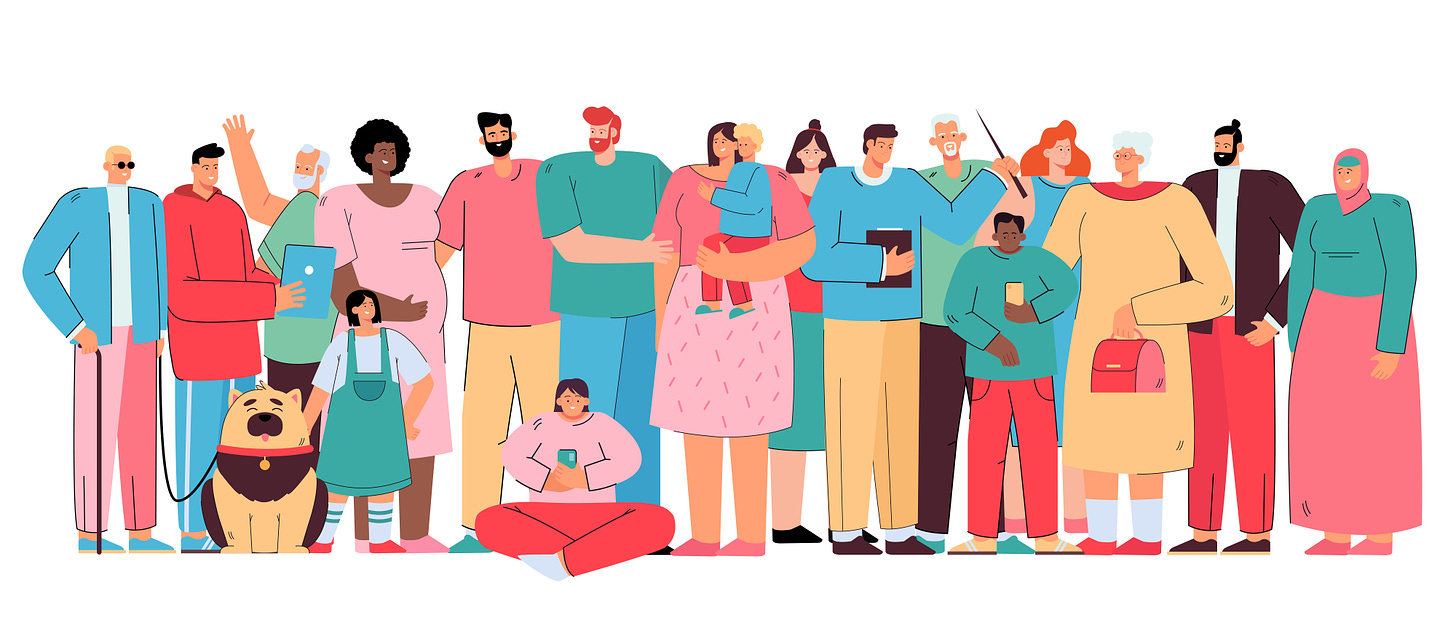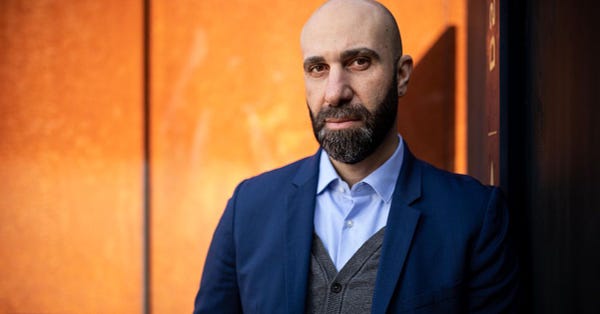On the dangers of collective guilt and collective victimhood
“People are suddenly being categorized into groups”, laments Ahmad Mansour, an expert on Islamic Extremism. Assigning collective guilt creates rigid group identities that are dividing our society.
A commentary on “Menschen werden wieder in Gruppen eingeteilt. Wie rassistisch ist das denn?”, an interview with Ahmad Mansour, psychologist and expert on Islamic Extremism (published in Basler Zeitung on August 23, 2022)

In November of 2020, in an attempt to become an “actively anti-racist institution” in the wake of the vicious murder of George Floyd, the British Library published a list of more than 300 writers which had a “connection” to the slave trade or colonialism. Now, this list wasn’t limited to authors who were proactively participating in the slave trade or openly racist. In fact, this “connection” could be any ancestor who had made money from the slave trade or had been associated with it in some way, sometimes generations ago, as long as there was blood relationship. George Orwell, for instance, had the misfortune to have a great-grandfather who was a slave owner in Jamaica. Samuel Taylor Coleridge was included in the dossier of culprits because a nephew in Barbados worked with estates where there were slaves. Even Ted Hughes, born as late as 1930, made it on the list because of some distant family connection to the London Virginia Company over 300 years (!) prior to his birth.
After medial outrage over the absurdity of including someone like Hughes on this list, the British Library eventually apologized to Hughes’ widow and later withdrew the whole dossier. This temporary withdrawal, however, doesn’t change the fact that Orwell, Coleridge, Hughes and many others had been put on this list not because of their own wrongdoing, but because of the wrongdoing of someone they happen to be related to, or in other words: due to guilt by association. This is a troublesome idea at best and a very dangerous idea at worst. Judging someone because of their great-grandfather’s misdeeds means judging someone for actions they didn’t do. It reduces an individual (in this case posthumously even) to the randomness of their blood relationship, heritage or nationality, and ultimately disregards their own actions. And that, well, is racist.
Guilt by association is closely connected to collective guilt – they are two sides of the same coin. Collective guilt is the idea that a certain trait (skin color, nationality, etc.) decides whether you belong to the guilty party or not. Where once the group of oppressors had power, it is now to be given to the ones who were once oppressed. Collective guilt leaves out everything positive about that collective and therefore warps the view of the collective on itself. Like the sword of Damocles, the guilt hovers above everything, demanding eternal repentance over ancestral sins.
If we take the idea of collective guilt to its logical conclusion, then we condemn one side to being the eternal perpetrator and the other side to being the eternal victim. We reduce people to their random genetic and sociocultural heritage which makes them a random member of any given random group according to some random external features. As Ahmad Mansour explains in his interview with Basler Zeitung, this is now happening all the time: “People are suddenly being categorized into groups: skin color, religious belief, nationality. All minorities are good, old and white people: very bad. How racist is that?”


Paradoxically, it is in the name of so-called “anti-racism” that these ideas are being propagated and even more astoundingly, most (white, majority) people won’t say anything against it. Having internalized their guilt by association – i.e. the fact that they have a connection to people who did something wrong in the past – and wanting to be “morally superior”, as Mansour states, they show off their “anti-racism”. But this is nothing but a new kind of racism disguised as tolerance. At its core, “anti-racism” means telling one group of people they are inherently privileged and blameworthy (right now, the worst you could be is white, male, straight and old) and another group of people they are inherently victims and constantly discriminated against (anything but white, male, straight and old), which creates an infinite loop of culprits and victims that is incredibly misanthropic. And this dynamic is dangerous.
For one, it creates the toxic “Us versus Them” dynamic that can be observed on both sides of the Atlantic and has divided many Western societies. Random external factors such as ethnicity or nationality (or sex or sexual orientation) determine whether people belong to a group of oppressors or victims. Instead of their own opinions and actions, a person is defined by their inherent group identity. Ted Hughes was canceled not for writing racist books, but for being a white Englishman (therefore guilty) who happened to have a distant family relation to colonialism that dates back centuries ago (therefore extra guilty). Since Hughes is dead, he cannot even defend himself, but if he were alive, public media and academia would probably cancel him straight away because he happens to be part of the declared group of oppressors, which he can’t escape.
Which bring us to the second point: The fact that Cancel Culture is thriving more than ever is a direct result of this dangerous mix of indoctrinated collective guilt and self-sacrificing tolerance. Where group identity based on your ethnicity, nationality, etc. matters more than your individuality, discourse becomes racially, socioculturally and therefore emotionally charged, to the detriment of nuanced, thoughtful and respectful conversation. Constructive criticism and debate become impossible because the person belonging to the victim group can always cast a stone at the person from the oppressor group and shut them down. But it goes far beyond that: People are now treated with hostility by their own group for not displaying the opinion they’re supposed to have as a member of that given group (see for instance: Professor John McWhorter who, as an African-American, criticizes Critical Race Theory which made him quite unpopular with his peer group). This kind of Manichean mindset stifles any kind of conversation or debate. If you are a Person of Color, you must be oppressed, an eternal victim, you are confronted with racism everywhere. If you are white, you are oppressive, you are privileged, you always need to make amends. If you are female, you are always suffering from the patriarchy, you are always treated unfairly, and you must fight against it. And so on and so forth. In this climate of modern tribalism, you must either fully agree with the dictated opinions of your group or you are banished from it forever.1
As a last consequence of constant guilt and victimization, you will get a generation of very angry and/or very depressed people. If you tell people long enough that they are racist/misogynistic/(insert group here)-phobe because they are white/male/straight/(insert group here), or that they are always oppressed and disadvantaged because they are People of Color/female/LGBTQ+/(insert group here), it erodes the capacity of constructing inherent self-worth on both sides. Telling people that they’re supposed to feel guilty despite having done nothing wrong, ostracizing them for crimes of their ancestors and therefore taking away any possibility of feeling proud of who they are, will create anger, distrust and – inevitably – more hate. Telling people that they’re supposed to be victims by default, treating them differently in the name of “anti-racism” or “equity” as if they weren’t able to make it on their own, and therefore taking away any possibility of feeling proud of what they do, will create anger, distrust and – yes – more hate. It poisons the possibility of an open, unprejudiced encounter between people who belong to different groups and eventually kills mutual understanding, diversity and individuality.

We need to decouple the individual person from whatever supposed group identity they belong to and go back to focusing on a person’s character, not on their external features. The world is much more complex than a mere “oppressor/victim” dynamic and it is certainly more complex than assigning guilt to anybody who looks like or is connected to somebody who has done something wrong in the past. Orwell was no racist2, neither were Coleridge or Hughes. The European and American West needs to step away from this anachronistic idea of perpetual guilt or else it will be swallowed up in a dynamic of (self-)hate that will divide societies and will make any discussion or debate impossible for fear of being punished, canceled, labeled discriminatory or else. No one is guilty by birth. No one is a victim by birth. The only thing we are by birth is human.
About the author: Born 1987, with roots in Germany and the Philippines, living in Spain. Constantly curious and eager to learn new things. Freedom > safety. Your own opinion > groupthink. Coffee > tea. Podcast recommendations: The Gloves Come Off: A New Strategy for Fighting the Woke | Rubin Report with Douglas Murray and, again, How Anti-Racism Is Hurting Black America | John McWhorter & Jordan Peterson
Die deutsche Version des Artikels findet sich hier:
I always wonder: What about people of biracial origins? There apparently is no place for them in this black-and-white mindset.
Read his great short story “Shooting an Elephant” and you’ll see.




